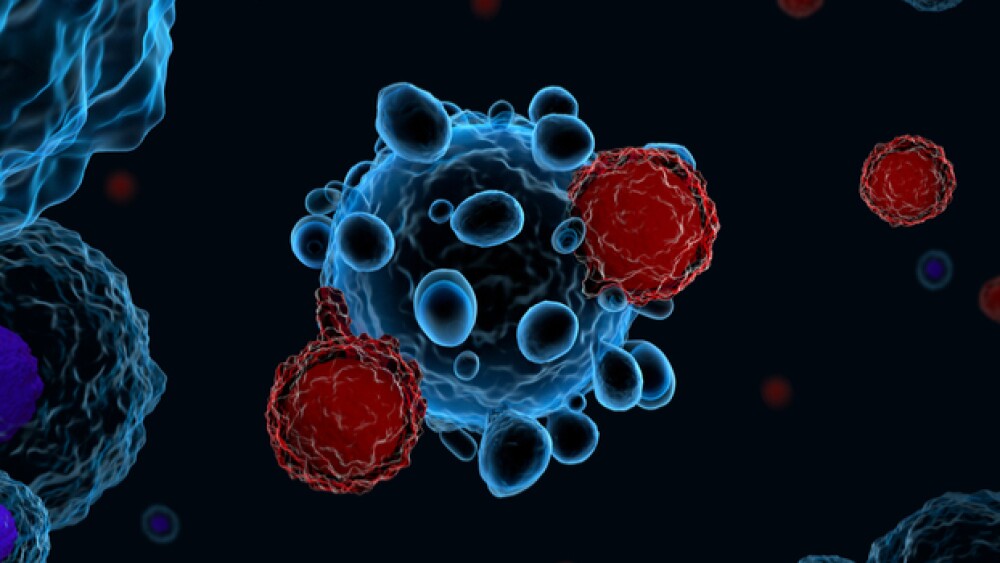Precision BioSciences recently received a notice of allowance for a new patent for PBCAR19B, its stealth cell, CD19 allogeneic CAR T candidate for non-Hodgkin lymphoma.
Precision BioSciences recently received a notice of allowance for a new patent for PBCAR19B, its stealth cell, CD19 allogeneic CAR T candidate for non-Hodgkin lymphoma.
“This approach may potentially allow the cells to persist longer in the body,” Matt Kane, co-founder and CEO of Precision, told BioSpace from his Durham, North Carolina office.
Because allogeneic therapies use cells from donors, they are seen as foreign by the immune system and typically are rejected by the body after two to three weeks.
Precision BioSciences’ stealth approach reengineers the allogeneic cells, inserting the PBCAR19B construct into the T Cell receptor alpha constant (TRAC) locus in a single gene-editing step.
In addition to the chimeric antigen receptor (CAR), the compound includes a short hairpin RNA (shRNA) that knocks down the expression of beta -2 microglobulin so fewer CAR T cells are killed by cytotoxic T cells. The shRNA also reduces the number of CAR T cells that are rejected by natural killer cells.
This protection, Kane hopes, will enable the reengineered cells to circulate longer in the body – hence greater persistence of CAR T cells in the body – as well as to also exhibit a better safety profile than non-engineered allogeneic CAR T cells.
Just how long those engineered cells will persist will become clearer once human clinical trials begin the first half of this year.
“We’ll also be looking for response rates and tumor reduction,” he said of the upcoming trial. This will be the company’s fourth program to reach the clinic.
Precision BioSciences’ focus is divided between optimizing allogeneic CAR T cell therapies and permanently correcting genetic diseases through in vivo gene editing.
Of its cell therapy programs, three focus on non-Hodgkin lymphoma, with two of those programs in the clinic. One additional program is in the clinic for multiple myeloma. Additional programs for blood cancers and solid tumor cancers are at the preclinical stage, along with the stealth cell program.
The lead allogeneic CAR T program for non-Hodgkin’s lymphoma, he said, “is seeing tumor reduction greater than 90%.” The same trial showed a 95-fold increase in peak expansion of CAR T cells per milliliter that began a dramatic upward trajectory on day three and peaked at 10.
Meanwhile, the nine in vivo gene editing programs are all at the research or preclinical stage, with primary hyperoxaluria type one and Duchenne muscular dystrophy, and two others for undisclosed targets listed as priorities.
Both CAR T and in vivo therapeutic platforms use ARCUS®, the gene editing technology on which the company was founded. It is based on a very small editing system of only 364 amino acids. The small size makes for easier delivery to specific tissues and cells.
“Having a small editing system lets us use common viral or non-viral delivery systems to deliver enzymes to specific tissues,” Kane said. “In vivo editing is permanent. You can’t take it back, so being able to avoid random off-targeting is game-changing.”
ARCUS uses I-Crel, a natural genome editing enzyme, to make the cuts for insertions or deletions, and its 3’ “sticky ends” promote efficient homology-directed repair, according to company literature. I-Crel inactivates itself after the genome is edited.
On the strength of ARCUS, Precision BioSciences entered into an in vivo gene editing collaboration with Lilly last year.
“It’s focused around up to six different in vivo gene editing targets,” Kane said. “Lilly has selected the first three, and one of those targets Duchenne muscular dystrophy.”
The company also is collaborating with Servier for hematologic cancers and solid tumors. PBCAR0191 is in clinical trials with Servier. PBCAR19B is likely to enter clinical trials mid-year.
Precision BioSciences was founded in 2006, about the time that gene therapy clinical trials were halted in the U.S. after some tragic outcomes.
“There was a long period when gene therapy research was only performed at academic centers, while the pieces were being figured out,” Kane said. “Therefore, the first applications for ARCUS were in plant engineering and biomanufacturing to reengineer cells for monoclonal antibodies.
“In 2014, the field of gene therapy reemerged and some of the key obstacles to CAR T therapy began to be resolved.”
That provided great opportunities for ARCUS technology.
The first-generation CAR T therapies demonstrated amazing efficacy, he said, “but the technology wasn’t scalable and outcomes varied. There were some safety issues,” as well as limited patient access. More precise, controllable gene editing could improve that situation.
“Today, gene editing is still in its early days,” Kane said. None-the-less “we can produce allogeneic CAR T therapies at scale with an acceptable safety profile and impressive early responses.” Kane cautioned that durability of response remains to be determined.
Currently, Precision BioSciences is focused on getting its therapies into human studies and, for early-stage products, establishing proof of concept to demonstrate curative treatments for genetic diseases.
“We’re fortunate to be in this position after only 15 short years,” Kane said.
Featured Jobs on BioSpace






